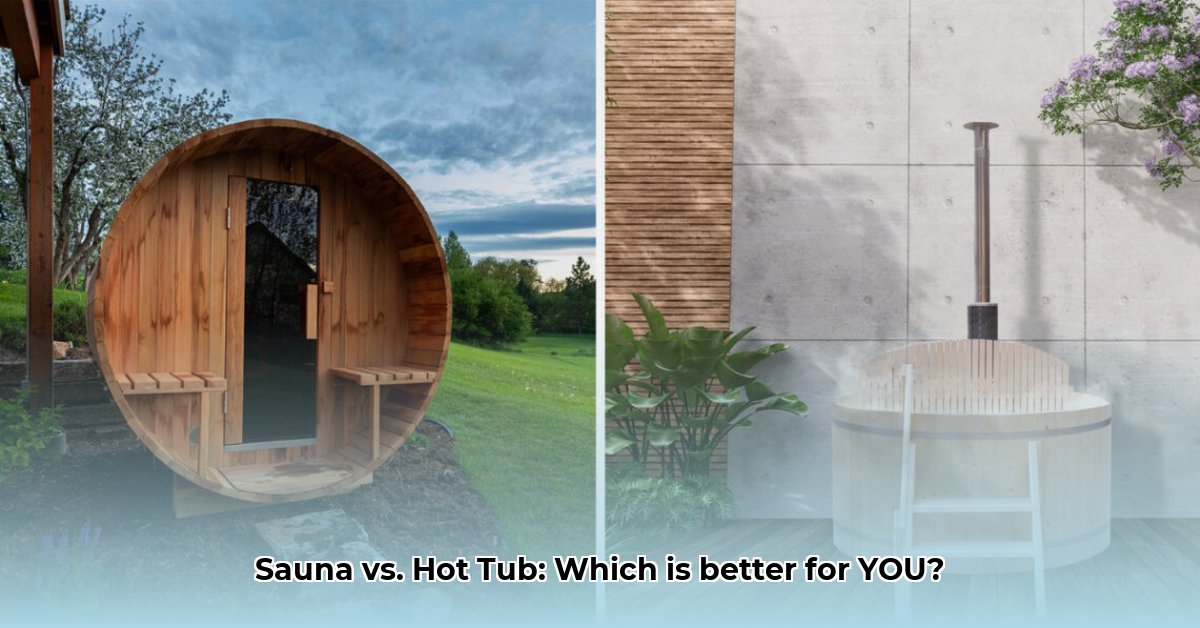Considering a sauna or hot tub for your home? Both offer unique paths to relaxation and improved well-being, but understanding their differences is key to making the right choice. This comprehensive guide compares user experience, health benefits, maintenance, and costs to help you determine which option best fits your lifestyle and budget. For saltwater hot tub options, check out this resource.
Dry Heat vs. Buoyant Soak: Understanding the User Experience
The primary difference between saunas and hot tubs lies in the way they deliver heat. Saunas use dry heat to raise your core temperature, promoting intense sweating and a detoxifying sensation. Hot tubs, on the other hand, immerse you in warm water, creating a buoyant, weightless experience that soothes muscles and eases tension.
- Sauna: Dry heat, intense sweating, detoxifying sensation.
- Hot Tub: Warm water immersion, buoyancy, muscle relaxation.
Beyond the type of heat, consider the social aspects. Saunas can be enjoyed alone or with a few close companions, offering a more intimate and introspective experience. Hot tubs, with their larger size and inviting water, are ideal for socializing with friends and family.
Health Benefits: From Cardiovascular to Muscle Relief
Both saunas and hot tubs offer a range of potential health benefits.
Saunas have been linked to improved cardiovascular health, as the heat increases heart rate and blood flow, similar to moderate exercise. Some studies also suggest that regular sauna use may help reduce the risk of certain chronic diseases. The intense sweating experienced in a sauna can also help to cleanse the skin and promote detoxification.
Hot tubs, with their warm water and massaging jets, are particularly effective at relieving muscle soreness and joint pain. The buoyancy of the water reduces pressure on the joints, while the heat helps to improve circulation and reduce inflammation. Hot tub use has also been shown to lower blood pressure and improve sleep quality.
- Sauna: Cardiovascular health, detoxification, skin cleansing, potential chronic disease risk reduction.
- Hot Tub: Muscle relaxation, joint pain relief, improved circulation, reduced inflammation, lower blood pressure, improved sleep quality.
It’s important to note that while both saunas and hot tubs can offer health benefits, they are not a substitute for medical treatment. Consult with your doctor before using a sauna or hot tub if you have any underlying health conditions.
Maintenance: Upkeep and Long-Term Costs
Maintaining a sauna or hot tub requires a commitment of time and resources. Saunas generally require less maintenance than hot tubs, as they do not involve water chemistry or filtration systems.
Hot tubs require regular water testing, chemical balancing, and filter cleaning to prevent the growth of bacteria and algae. The water must also be drained and replaced periodically. These maintenance tasks can be time-consuming and costly.
- Sauna: Less maintenance, no water chemistry, easier to clean.
- Hot Tub: More maintenance, requires water testing, chemical balancing, and filter cleaning.
The cost of maintaining a sauna or hot tub will depend on factors such as the size of the unit, the frequency of use, and the local cost of water and electricity.
Choosing the Right Option: Key Considerations
Selecting the right option depends on your individual needs and preferences. Consider the following factors:
- Budget: Saunas are often less expensive to purchase and maintain than hot tubs.
- Space: Saunas require less space than hot tubs, making them a better option for smaller homes.
- Maintenance: Saunas require less maintenance than hot tubs, saving you time and effort.
- Health Benefits: Consider which health benefits are most important to you.
- Lifestyle: Think about how you plan to use your sauna or hot tub.
Sauna Maintenance: A Detailed Overview
Sauna maintenance is straightforward, focusing on cleanliness and component upkeep.
Cleaning
- Sweep or vacuum regularly to remove dust and debris.
- Wipe down interior surfaces with a damp cloth and mild detergent.
- Periodically clean benches with a sauna cleaner.
Heating Elements
- Inspect electric heaters for damage or corrosion.
- Clean heating elements according to the manufacturer’s instructions.
- Ensure proper ventilation to prevent overheating.
Long-Term Care
- Check wood for signs of rot or damage.
- Apply wood sealant or preservative as needed.
- Inspect and maintain the door and other hardware.
Hot Tub Maintenance: A Detailed Overview
Hot tub maintenance is more involved, requiring regular attention to water chemistry and filtration.
Water Chemistry
- Test water regularly for pH, alkalinity, and sanitizer levels.
- Adjust chemical levels as needed to maintain proper balance.
- Add shock treatment to kill bacteria and algae.
Cleaning
- Clean or replace filters regularly.
- Scrub the hot tub shell with a mild detergent.
- Drain and refill the hot tub every few months.
Heating System
- Inspect the heater for damage or corrosion.
- Clean heating elements according to the manufacturer’s instructions.
- Ensure proper water flow to prevent overheating.
Covers and Accessories
- Clean the hot tub cover regularly to prevent mildew.
- Inspect the cover for damage and replace as needed.
- Use a cover lifter to make it easier to remove and replace the cover.
Sauna vs. Hot Tub: A Side-by-Side Comparison
| Feature | Sauna | Hot Tub |
|---|---|---|
| Heat Type | Dry heat | Warm water |
| Primary Benefit | Detoxification, cardiovascular health | Muscle relaxation, joint pain relief |
| Maintenance | Low | High |
| Water Usage | Minimal | Significant |
| Chemical Use | None | Required for sanitation and water balance |
| Social Aspect | More intimate, can be solitary | Ideal for socializing |
| Cost | Generally less expensive | Generally more expensive |
| Space | Requires less space | Requires more space |
Choosing the Right Wellness Solution: Final Thoughts
Whether you choose a sauna or a hot tub, both offer unique benefits for your health and well-being. By carefully considering your needs, preferences, and budget, you can select the option that is right for you. Embrace the path to relaxation and wellness that best suits your lifestyle.
- Glass Tiles for Kitchen: Style and Durability Tips - November 30, 2025
- Decorative Wall Tiles for Kitchen: Stylish Design Ideas - November 29, 2025
- Decorative Wall Tiles: Style Your Home with Unique Designs - November 28, 2025










